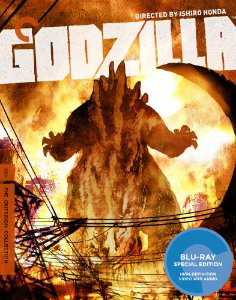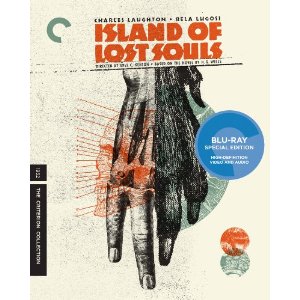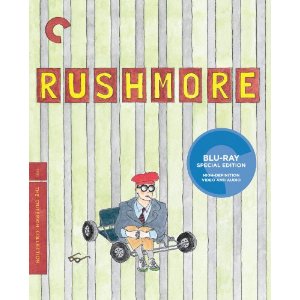MEETING THE CRITERION: Reviews of GODZILLA KING OF THE MONSTERS, ISLAND OF LOST SOULS and RUSHMORE on BluRay.

This month kicks off a new and very regular Criterion review column by yours truly, handed over some months ago by the faithful and much missed Rodney Perkins. As I've been cycling through the discs I've come to the conclusion that the best way to tackle Criterion is in column form. For now expect a longer review highlighting one title from that month and two or three smaller reviews at the end.
GODZILLA KING OF THE MONSTERS

To say I was elated to be receiving Criterion discs again is an understatement. I have been introduced to so many great films by the label, that it's fair to say I've found Criterion an indispensable guide to what must be watched in the process of educating myself about great cinema in general. Criterion looms so large, in fact, that it seems appropriate to begin this year, and restart this column, with a review of one of the biggest monster movies ever, Godzilla, presented here in both the adulterated American version (1956) and the original Japanese (1954).
It's tempting to plant this release in the same territory afforded to other classic horror and sci-fi fare on the Criterion label. After all, Godzilla is a cinematic cousin to The Blob, The Atomic Submarine, and Fiend Without A Face. But the truth is, those, and almost all other fifties sci-fi horror films, are dwarfed by Godzilla in terms of cultural influence. There are more than two dozen Godzilla films alone in the kaiju canon and the genre of kaiju itself dates directly back to the 1954 original.
But apart from cultural infuence, Godzilla remains one of the most remarkable films of the 1950's. It sings with a concern for humanity amidst showcasing the death and destruction that follow it's eponymous character even as it embraces that character as a wonder of the natural world and beyond. It is rife with political and social observations of post-war Japan that ring true today of human society spanning the globe and utterly sincere about the suffering of Japan's populace in way that makes the lizard a timeless and fluid metaphor. Originated as a statement about the inhuman use of Atomic weaponry in Nagasaki and Hiroshima and the newly discovered dangers of radioactive fallout made apparent in the Daigo fukuryu maru tragedy, Godzilla, in fact, refuses to be contained as merely a symbol of the dangers of living in the atomic age.
In the film we encounter him as a creature of dark grandeur, preternatural. The fact that he rises out of the sea and his enormous size makes comparisons to the Lovecraftian old ones inevitable to those who see the lizard in more than political terms. Furthering this sort of dread induced interpretation, mankind has also been awakened by science, not only to the possibility of physical individual destruction but the very insignificance of man as a species. Long after we are gone, stomped out of existence, Godzilla will remain; a possible future that, like death itself, cannot be grasped without going mad.
In short referring to Godzilla as a "monster movie" barely scratches the surface. In fact the character of Godzilla is,somewhat secondary. There are many well presented human characters in the film who have far more screen time. The first such character is, in a sense, the general populace of post-war Japan. Early in the film we hear them speak in everyday tones about overcoming the tragedies brought about by war, they seem heroic in their very mundanity. We see them at work, at play, in villages, and cities- but wherever they are they exist in a space of unease, haunted by the specter of what can happen in a flash of light. When it does happen we see them suffer, persevere, cry out for one another, turn to their public servants for help, who in turn seek out the advice of experts. Opinions fly, tempers flare, and in the end community is threatened by something more than just Godzilla.
Most well developed are the characters who form the tragic love triangle in the film. Emiko, the daughter of paleontologist Prof. Yamane has fallen in love with Hideto, a salvage ship captain, forcing her to break off an arranged betrothal to Prof. Yamane's brilliant colleague Serizawa. All of these people are fighting to do what they deem best, not just for themselves, but the rest of the world. Emiko will stand by Serizawa if she must, Hideto is also willing to sacrifice his happiness. But ultimately it is Serizawa who makes the biggest sacrifice of all with his ultimate weapons technology that he himself uses to free his fellow men. The ultimate question posed by the story's end of course is whether all such sacrifices are too little too late. Godzilla is a grim film by any measure but despite offering a constant series of references to Hiroshima and Nagasaki, to radioactive fallout, and the effects on the fishing industry it is not by any means a cynical one.
As Godzilla is one of the most recognizable characters in the history of Japanese cinema, one might think that the average cinephile would have seen the original film before But we live in times where even real movie lovers have a growing list of classic films that simply never get watched. Piles grow, lists grow, but with great new films coming out all the time it becomes easy to ignore past great work simply on the basis of age. Godzilla's other problem is that the character is associated with camp. In America many more people have seen Godzilla vs. Mothra for instance, or the adulterated (most would say butchered) American 1950s redux than have seen or even had the opportunity to see, the original Japanese version. A recent Sony Classics two-disc stateside DVD set included both along with substantial extras but this Criterion release is the treatment that the film has truly needed.
The supplements here are stellar. The new restoration of both versions is outstanding and the new and improved subtitles make this yet another step above previous versions. David Kalat author of A Critical History and Filmography of Toho's Godzilla Series (McFarland Press) provides separate commentary on each film. There are special newly produced video interviews. New interviews with actor Akira Takarada (Hideto Ogata), Godzilla performer Haruo Nakajima, and effects technicians Yoshio Irie and Eizo Kaimai. The final interviews feature Akira Ifukube who wrote the films iconic score and Japanese critic Tadao Sato.
The two short featurettes deal with the film's effects and the history that inspired the filmmakers. Of these two by far the most fascinating is The Unluckiest Dragon, which offers the observations of historian Greg Pflugfelder on the Daigo fukuryu maru tragedy in which fishermen, unwittingly exposed to fallout from bomb testing, sickened and died, leading to the first widespread public knowledge of the dangers of radioactive poising. Rounding everything out are theatrical trailers and a booklet featuring an essay by critic J. Hoberman. I'll also mention a nifty bit of fold out packaging that causes Godzilla to tower high above the rest of the inner sleeve.
By way of a closing word, I find it interesting that no less a critics than Roger Ebert more or less dismissed Godzilla when it recently made a run of arthouses in the US. His basic assertion was that the film simply could not be taken seriously. A man in a monster suit stomping miniature cardboard cities? The irony of course is that we live in a time when monsters wear people suits and destroy cities in real life. Godzilla is a vibrant film that rings with all the nostalgic fun one could associate with fifties monster movies but it also happens to take it's message of mankind's need for self-reflection and self restraint deadly serious.
ISLAND OF LOST SOULS

One of the most important home entertainment releases of last year. This 1932 pre-code classic has been long unavailable, and never before available on DVD much less BluRay, Island of Lost Souls is not only the definitive treatment (among many) of H.G.Wells novel, Island of Dr. Moreau, it is a crowning achievement in cinema period, easily as ghoulish and disturbing and entertaining as contemporaneous horror films like Dracula (1931), Frankenstein (1931) or even Bride of Frankenstein (1935) For it to have fallen into the hands of Criterion and make it's hi-def home entertainment debut here- well, a film fan couldn't ask for a happier ending. But they get one anyway.
The story concerns a man stranded on a strange island inhabited by a reclusive scientist whose experiments with the island's animals have resulted in grotesque abominations called manimals- half human half animal creatures that live under the scientists cruel dominion. A potent critique/satire of scientific hubris Island of Lost Souls also comments on religion, sexual mores and politics losing none of the power of Well's original novel.
The special effects makeup in the film works spectacularly well, so well in fact that this is liable to unnerve those who are bit queasy. One of my favorite memories ever is a screening of this film I helped organize for Cornerstone Festival Imaginarium. A packed circus style outdoor tent decorated in Wellesian theme, an 8x12 foot plywood screen and a sixteen millimeter projector that required me to use my free hand to keep Junebugs from flooding the gate. It wasn't the adults that held my attention. Up past the folding chairs were a group of about twenty kids ages 8-11 and they were absolutely glued. By the time Bela Lugosi jumped toward the camera in grotesque closeup shouting, "Not men....things!" I knew that I had helped create several new members of the monster generation. Long live the classics.
The extras here are, without hyperbole, among the best ever assembled for a Criterion disc considering the audience that will be most interested in purchasing this. The audio commentary is handled by classic horror film historian Gregory Mank who is simply one of the most knowledgeable people on the planet when it comes to the genre. But it's in the interviews that serious genre fun is to be had. Ever wanted to see Bob Burns, Rick Baker and John Landis get all geeky with each other about their love for the genre? How about an interview with director Richard Stanley exploring the pitfalls of adapting Wells story for a version that wound up starring Marlon Brando and Val Kilmer? How about one with Devo's founding members Gerald Casale and Mark Mothersbaugh about importance of the film to the development of their artistic worldview. There's also an interview with noted genre historian David J. Skal. The booklet offers an essay by critic Christine Smallwood.
RUSHMORE

I've put off reviewing this mostly because it's so dear to me. Rushmore is a love letter to folks whose whole life has been about trying to fit in, find love and fall towards the light. It's the film that kicked off Bill Murray's renaissance, it was the film that finally brought Wes Anderson to the place where he could launch into the marvelous career he's enjoyed (I simply can't credit Bottle Rocket with that. It made people take notice but Rushmore was the proof Anderson was breaking out). But most, most importantly Rushmore is a stunningly funny, heartfelt embrace of the 'artiste in everyone (as well as a well intentioned jackslap). Two men, one a broken businessman cynic named Bloom and the other a breaking dreamer named Fischer, fall at the feet of Miss Cross and find love even as they get busy crucifying themselves and each other. Both die to the old are reborn into the new and we lucky viewers watch their story iwrapped up in a hilariously moving visual aesthetic complimented by one of the great soundtracks of the nineties. To say the least Criterion is where this belongs and BluRay is the perfect format to showcase Anderson's twonky vision.
The extras are formidable here even if they are basically ported over from the previous DVD release. The only new extra is the simply gorgeous hi-def digital transfer supervised by Anderson himself. You get a commentary by Anderson, cowriter Owen Wilson, and actor Jason Schwartzman, a behind the scenes doc, Max Fischer Players adaptation of Armageddon, Out of Sight and The Truman Show made for the 1999 MTV Movie Awards, the Charlie Rose interview with Anderson and Murray, cast audition footage, storyboards, a theatrical trailer and a booklet with essay by critic Dave Kehr.
See you guys in a few weeks with another three or four picks from the vaunted Criterion vaults.







